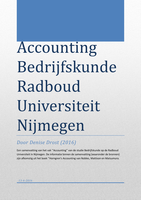Samenvatting
Accounting Bedrijfskunde Radboud Universiteit: Engelse samenvatting van het boek inclusief bronnen!
- Vak
- Accounting
- Instelling
- Radboud Universiteit Nijmegen (RU)
Een Engelse samenvatting van het vak Accounting van de studie Bedrijfskunde op de Radboud Universiteit Nijmegen. Het boek waar alle informatie (inclusief bronnen) vandaan komt heet ''Horngren's Accounting'' (10e druk, 2014) en is geschreven door Nobles, Mattison en Matsumura. In de samenvatting zij...
[Meer zien]





